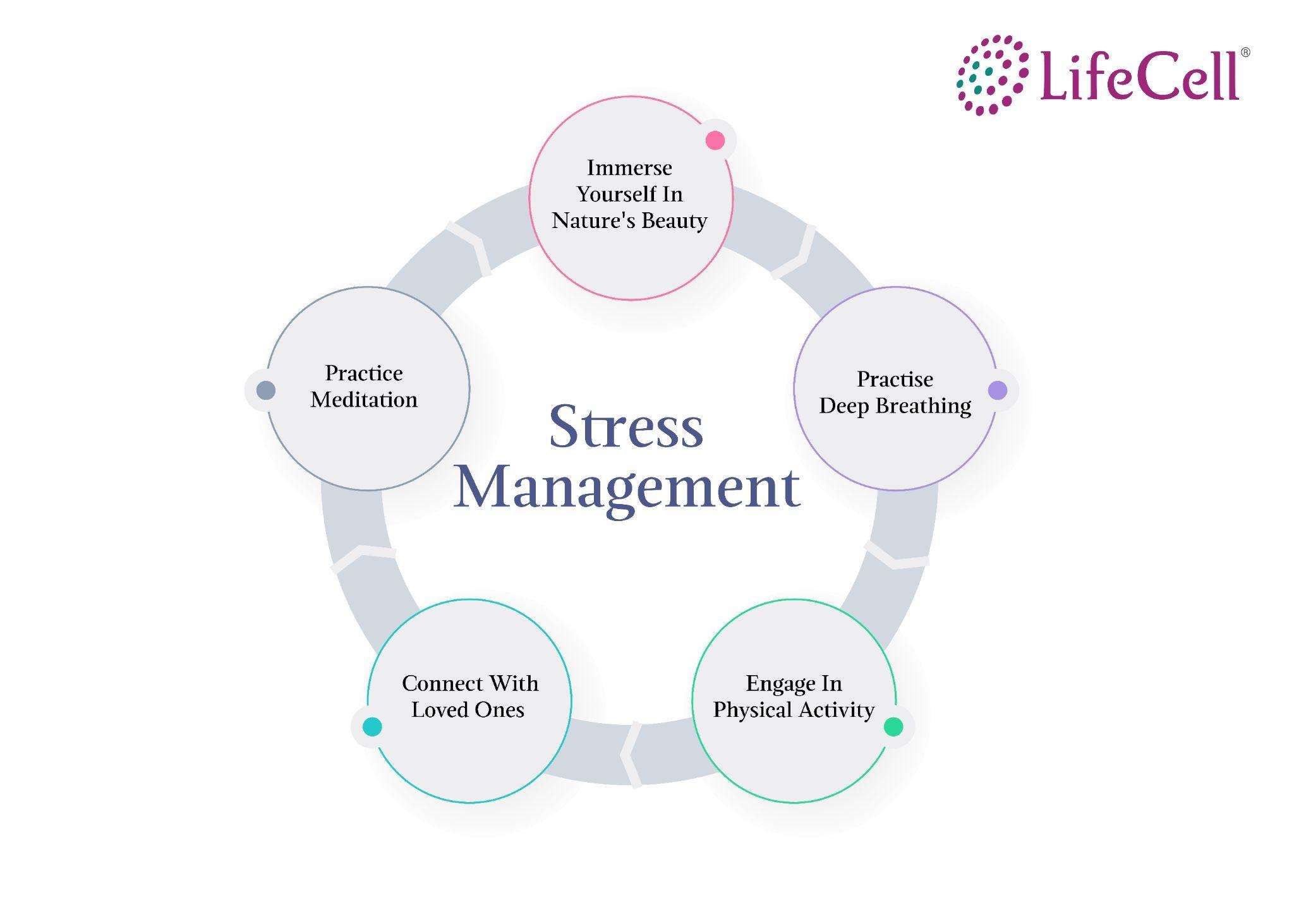In the hustle of our fast-paced lives, stress has become an unwelcome challenge, subtly affecting our well-being. Surprisingly, a recent survey in India revealed that 86% of men reported high stress levels, surpassing women. This eye-opening statistic underscores the urgent need to understand and address the far-reaching side effects of stress on our lives.
Let’s dive into its symptoms and understand how it impacts our health.
Table of Contents
What Are The Symptoms Of Stress?
Understanding the symptoms of stress relies on recognizing the body’s physiological responses during stressful situations.
The body’s autonomic nervous system controls essential functions like heart rate, breathing, and vision. When we experience stress, it triggers the “fight-or-flight” response to help us deal with difficult situations.
If we have long-term or chronic stress, this stress response keeps getting activated, which can lead to physical, emotional, and behavioral symptoms.
Over time, persistent stress can take a toll on the body, gradually affecting overall health.
Physical symptoms of stress can include:
- Body aches and pains
- Chest pain or a rapid heartbeat
- Fatigue or difficulty sleeping
- Headaches or dizziness
- High blood pressure
- Muscle tension or jaw clenching
- Stomach or digestive problems
- Sexual difficulties
- Weakened immune system
Stress can also exhibit emotional and mental symptoms, such as:
- Anxiety or irritability
- Depression
- Panic attacks
- Feelings of sadness
Now that we know about the symptoms of stress, it is also essential to understand the possible side effects that stress can have on our health.
General Side Effects Of Stress On Health

1. Increased Risk Of Chronic Diseases
Stress can contribute to the development or worsening of chronic conditions such as heart disease, diabetes, and autoimmune disorders.
2. Weakened Immune System
Prolonged stress can suppress the immune system, making individuals more vulnerable to infections, colds, and other illnesses.
3. Mental Health Issues
Stress is closely linked to mental health problems, including anxiety disorders, depression, and an increased risk of developing mood disorders.
4. Sleep Disturbances
Stress can disrupt sleep patterns, leading to difficulty falling asleep, staying asleep, or experiencing restful sleep, which can negatively impact health and well-being.
5. Physical Symptoms
Stress often manifests in physical symptoms such as headaches, muscle tension, digestive issues (e.g., stomach aches, nausea), and fatigue.
In addition to its general impact on health, stress significantly affects the male reproductive system. Long-term stress affects men’s hormones, sexual function, and fertility. Understanding these effects is essential for overall well-being.
Now, let’s delve into how stress influences the male reproductive system.
Effects Of Stress On The Male Reproductive System
Stress can exert numerous effects on the body, particularly on the reproductive system. Let’s explore a few of them:
1. Reduced Libido
Stress can lower the desire for sex in men. High levels of stress hormones like cortisol can decrease testosterone production, which is important for a healthy sex drive.
2. Erectile Dysfunction
Chronic stress can worsen erectile dysfunction (ED) by raising epinephrine levels. This process, in turn, tightens the cavernosal smooth muscles in the penis, making it difficult to get or keep an erection.
3. Decreased Sperm Production
Stress disrupts the hormonal balance that regulates sperm production in the testes. This disruption can result in lower sperm production, leading to lower sperm count and potential fertility issues.
4. Hormonal Imbalance
Stress triggers the release of stress hormones, such as cortisol and adrenaline, which can disrupt the normal hormonal balance in the body. Hormonal imbalances can affect the production and regulation of testosterone, which is crucial for male sexual health and fertility.
5. Decreased Sperm Quality
The effects of stress on fertility can be significant, particularly on sperm quality. The presence of stress hormones can reduce sperm count, impair motility, and cause abnormal sperm shape, affecting fertility.
Healthy Ways To Relieve Stress
Managing stress may seem challenging, but don’t worry! Here are easy tips to bring calm and restore peace in your busy life. Try these quick stress busters—they really work!

1. Immerse Yourself In Nature’s Beauty
Strolling through a park or enjoying a leisurely walk can effectively ease tension, promote relaxation, and foster a sense of calm in your mind.
2. Practice Deep Breathing
Deep breathing techniques effectively improve stress management in daily life. Take slow, deep breaths, filling your lungs and exhaling gently. Focus on your breathing pattern and let go off tension with each exhale.
3. Engage In Physical Activity
Exercise is a great way to relieve stress. Physical activities such as running, yoga, or playing a sport you enjoy can release endorphins. Endorphins are natural mood boosters.
4. Connect With Loved Ones
Spending time with people who make you feel good provides emotional support. Talk about things that matter to you. Feeling connected to others can help you feel better and reduce stress.
5. Practice Meditation
Take a few minutes daily to sit quietly and focus on your breath. This simple practice can help you relax, de-stress, and improve your overall well-being.
Embracing a healthy lifestyle enhances your mental well-being and plays a crucial role in managing stress & optimizing reproductive health.
However, chronic stress can negatively impact sperm quality and hormonal balance in men, potentially leading to fertility issues. If you’re concerned about the influence of stress on your fertility, LifeCell’s SpermScore test offers a comprehensive solution to assess your sperm health and provide valuable insights. This test allows you to assess 10 different sperm health parameters and 14 sperm health conditions in compliance with WHO. This comprehensive evaluation gives you a clear understanding of your fertility and provides valuable advice on how to proceed.
Final Note!
It is crucial to have a comprehensive understanding of the potential side effects of stress on your fertility and reproductive health. Chronic stress can disrupt sperm quality, hormone balance, and reproductive functions. However, effectively managing stress and proactively assessing sperm health with LifeCell’s SpermScore test helps you to gain a clear understanding of reproductive status.
So why wait, order your kit online today and experience the benefits firsthand from the comfort of your home.
FAQs
What are the five negative consequences of stress?
Experiencing stress can harm physical health, contribute to mental health disorders, impair cognitive functioning, disrupt sleep patterns, and negatively impact relationships.
What types of foods help reduce stress?
Some foods that can help reduce stress include dark chocolate, asparagus, nuts, oysters, and green leafy vegetables.
Which hormone causes stress?
The primary hormone that causes stress is cortisol, which is released by the body in response to stressors.
In what way does stress impact the brain?
Stress can disrupt the balance of brain functions related to thinking, decision-making, anxiety, and mood, leading to changes in behaviour and emotions.
Can stress cause damage to the heart?
Yes. Prolonged stress can raise cholesterol, triglyceride, blood sugar, and blood pressure levels, all of which are known risk factors for heart disease. Additionally, stress can contribute to the accumulation of plaque in the arteries which can lead to heart-related problems.

